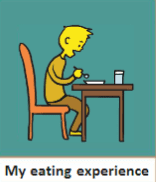Kim Stringer, Director of the Charity Vegetarian for Life, describes her thinking behind this new resource and asks for volunteers to help test it out.
I first had a Talking Mat conversation at the Alzheimer Scotland conference in 2019 and was struck by the way a picture of my likes and dislikes emerged. I wouldn’t have collected all these ideas together in a spoken conversation and I immediately thought this would be a great tool to use to explore an issue that Vegetarian for Life was becoming increasingly aware of.
We support older vegans and vegetarians, and those who care for them, and we had been hearing about some vegetarians with dementia who were asking for meat. It seemed unlikely to us that people who had chosen to be vegan or vegetarian because of their beliefs would suddenly reconsider these views. Staff and families were facing a dilemma and I thought Talking Mats would be a great tool to explore food preferences and perhaps help to find out if a person was genuinely asking for meat.
After initial conversations with Talking Mats we had a seminar to gather other team members’ thoughts, and we began to create the resource. We decided what topics we wanted to cover, how these could be grouped, and what top scales would work.
Dietary Choice

Not all vegetarians like to eat vegetables or meat replacement products and this topic is designed to allow people to express their food preferences. Meat and fish options are included in this topic to help get a reliable picture of a person’s beliefs. When considered along with the conversation arising from the Values topic this gives the opportunity to get a fuller understanding of someone’s motivations. Suggested top scale to use:
Want to eat / sometimes want to eat / don’t want to eat
My eating experience

This topic helps explore if someone is happy with their current situation. Some of the symbols cover general subjects, while others are more specifically vegetarian- or vegan-focused. We included things such as celebrations and events. Vegetarians and vegans will want to enjoy these too but may feel excluded if offered something like a salad while others eat burgers. Suggested top scale to use:
Happy / so-so / not happy
Values. Lifestyle

People adopt vegetarian or vegan diets for different reasons and these topics address the reasons behind this choice, and consider the wider lifestyle implications, not just diet. For example someone following a plant-based diet for health reasons may feel differently about toiletries and cleaning products which may have been tested on animals than someone for whom veganism is a philosophical belief. These topics help build a picture of the reasons behind the lifestyle preferences. Suggested top scales to use:
Values: very important / quite important / not important
Lifestyle: want / don’t mind / don’t want
We hope that the conversations generated by the mats will allow care providers to get to better know the person who is receiving care. They may also foster a greater understanding of vegetarianism and veganism.
For more information about good practice when catering for vegetarians and vegans living with dementia, please see Vegetarian for Life’s Memory Care Pledge.
This resource is now in the testing phase and we are looking for volunteers. If you think you can use the resource at least twice between now and the 17th of March please email info@talkingmats.com describing the setting(s) and clients you might use the resource with. We require up to 6 people for this phase.
As we head into World Alzheimer Month, April Dobson, Head of Dementia Care and Wellbeing at Hallmark Care Homes, shares how she introduced Talking Mats and the impact it has had. This is the first of 3 blogs.
These are the things I missed over the past couple of years
- the chat with the person in the shop
- the coffee and natter with a friend
- the catching up with family news
A big gaping hole was left in my life and I found myself wondering if that’s how someone with communication difficulties feels every single day
Over the years I have observed frustration and sadness in the person with dementia born out of not being able to be heard, and withdrawal and isolation in part due to not being part of a conversation, not having a connection. This frustration is reflected in carers and family members when they talk about communicating. They worry that they might be doing something wrong when their efforts don’t get the response they hoped for, and sometimes just stop trying to make a connection because it’s simply too difficult.
I believed there must be a way to hear these voices. My research lead me to believe Talking Mats could be a game changer for Hallmark and I became a Licenced Trainer in 2021. I proposed the following implementation;
- Training 2 key staff members per home
- Training Regional teams
- Using Talking Mats to support information gathering in our annual survey. Up until now the views of people living with dementia around their care had not been captured. More about this in a follow-on blog.
The Board at Hallmark were as enthusiastic as I was and our Executive Leadership Team also completed their Foundation Training.
Despite a return to lock down, I managed to follow my plan for face to face training (more or less). As of July 2022, I am really proud to report that Hallmark Care Homes has a total of 52 qualified Talking Mats practitioners within the team. What’s more, all 52 are just as excited as I am; here’s just one example of that from a member of the care team;
“The talking mats allowed us to be able to stay on the conversation by pictures and by keeping things on the mat to refer to…. And it was a really nice one to one time as well and their whole demeanour afterwards was amazing, completely different, really calm, really engaged, really alert. So yeah, we did notice the significant difference after doing that. And it was, it was a nice protected bit of time, to spend with them somewhere quiet”.
It is early days but I feel we have the foundations of something really special and important in place. Conversations are happening; there’s no pressure to talk – everyone has the options of being vocal or being quiet – but our skilled, trained team members are able to gently guide a conversation if necessary, taking cues from subtle body language or nuanced expressions.
This project has connected people; Hallmark residents, team members and families and I’ll tell you more about the impact that Talking mats has had in the next blog.
Talking Mats will be attending the Alzheimer Scotland conference on the 5th of September, come and say hello
 Online training login
Online training login 



